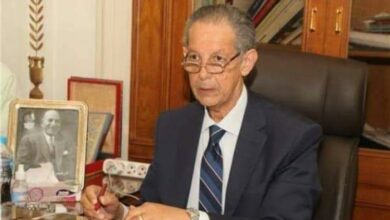After a stormy pre-election process that saw the Wafd Party join and leave the Freedom and Justice Party-led (FJP) Democratic Alliance, the former ran in the first round of People's Assembly elections on its own list. Faring poorly at the polls, the party has been left to rue its decision.
Egypt’s oldest political party, the liberal Wafd Party won only 12 out of the 150 seats decided the election's first round, according to preliminary results.
The fallout might have internal implications for the party. The run-up to elections saw disagreement over party leader al-Sayed al-Badawy's electoral strategy, including his unilateral decision to join in an alliance with the FJP and later pull out.
“Our results are catastrophic; it’s a shock and the party is worried. It no longer matters what can be done in the second and third phase to turn this around, this is much bigger than that,” said Essam Shiha, a member of the party’s parliamentary committee.
Wafd’s poor showing might be a bad sign for the opposition parties that were previously allowed under the Mubarak regime, according to Nabil Abdel Fattah, an analyst with the Al-Ahram Center for Political and Strategic Studies.
“This spells the end of the old political opposition parties that depend on slogans from the past rather than solid organization, a real platform and a real connection with people in the streets,” Abdel Fattah said, adding that Wafd “was very far away from the revolutionary forces in Tahrir and Egypt’s other squares.”
Judging by preliminary results, Wafd barely made a dent in the new parliament. In Cairo's list-based districts, it placed no better than third, usually behind the FJP and the liberal Egyptian Bloc, and in some cases behind the Salafi-led Nour Party and the moderate Islamist Wasat Party lists.
The story is similar in Alexandria and its surrounding areas. The party performed best in Port Said and Kafr al-Sheikh; in both areas, which comprise four constituencies in total, it polled behind FJP and Nour. Wafd expects to gain some seats in these four districts.
“It has caused a sorry situation inside and outside the Wafd,” Shiha said about the party’s poor showing. “It’s enough that people have lost faith with the party. The results are frightening.”
Shiha did not run in the elections because, as he said, “our lists were filled with remnants of the Mubarak regime.”
Asked for the reasons behind the poor showing, Shiha said, “The head of the party and the secretary general should be asked about this, as they were running this electoral battle. The budget for the elections was massive, the highest in the party’s history.”
Wafd had initially joined the Democratic Alliance alongside the FJP, but pulled out prior to the elections over a dispute regarding the allocation of seats between the two parties. The decision to join the alliance created internal divisions in Wafd since some members felt that it betrayed the party's liberal history. Shiha was one such critic of the alliance.
“Al-Badawy has proved his failure, whether in keeping alliances or organizing his own party,” said Abdel Fattah. “He was part of the businessmen [in the party] close to the Mubarak regime and as it stands he is an obstacle to the party’s progress.”
Those in favor of the alliance felt that it helped diminish the current polarization between liberals and Islamists in Egyptian politics. In retrospect, the decision to leave the alliance seems to have been to Wafd's detriment, in light of the Democratic Alliance's widespread victories in the first phase of voting. But Shiha believes that the FJP's success is catastrophic for the country.
“We feel it’s a national catastrophe,” Shiha said. “It reminds us of the setback of 1967, [when Israel defeated Arab armies], it is the destruction of a hundred years of Egyptian liberalism. We expected them to win but for it to be to this extent ― and by exploiting religion, bribing, interfering [with voting] and violating the election process ― leads to a worrisome future.”
“They’ve only won the first round and already are beginning to confront the military about the powers of the parliament and potentially turning Egypt into a parliamentary system,” Shiha added.




